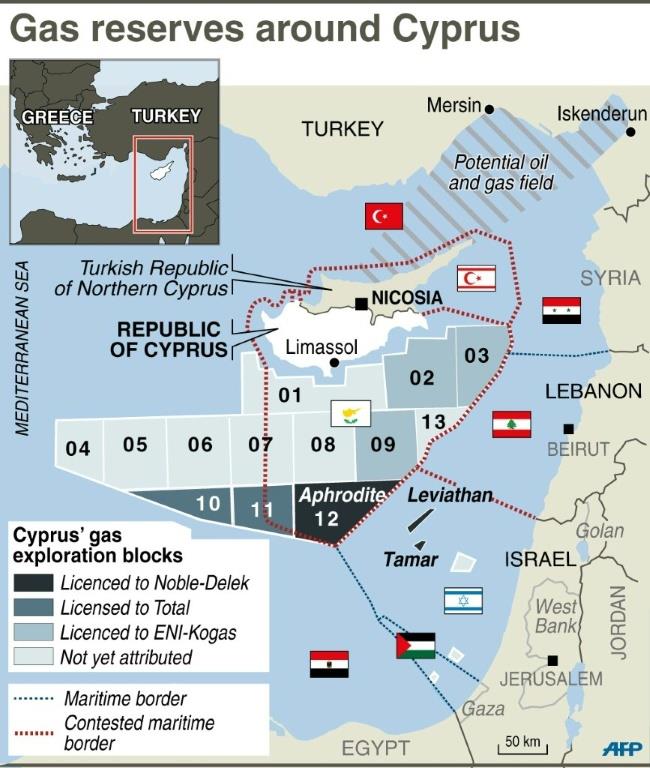
Cyprus, Israel, Greece see gas pipeline as peace catalyst
The leaders of Cyprus, Israel and Greece said Thursday that a planned gas pipeline from the eastern Mediterranean to Europe could be a "catalyst for peace" in a turbulent region.
Cyprus, which hosted the three-way talks, lies just 100 kilometres (60 miles) from the Syrian coast, and the three countries say cooperation holds the key to stability in a region wracked by conflict.
Water resources and tourism were also high on the agenda at the meeting between Cyprus President Nicos Anastasiades, Israeli Prime Minister Benjamin Netanyahu and Greek Prime Minister Alexis Tsipras.
The three countries will form a trilateral committee to study the plans to build a pipeline between Israel and Cyprus and on to Greece for gas exports to Europe, Netanyahu said.
The leaders also discussed plans for an underwater cable to connect the electricity grids of the three countries, he told a news conference after their talks.
"We're living through great turbulence," Netanyahu said, referring to the multiple conflicts in the Middle East.
Growing cooperation between the three democracies would advance "stability, security and prosperity" for their peoples and the region at large.
Netanyahu said they also discussed cooperation in water management, tourism, the hi-tech sector and firefighting as well as search-and-rescue missions in the eastern Mediterranean.
- 'Like-minded partners welcome' -
"Our partnership is not exclusive in design or nature, and we are ready to welcome other like-minded actors to join our efforts to promote coordination and cooperation, as well as regional peace and stability," the three leaders said in a joint statement.
"The discovery of important hydrocarbon reserves in the Eastern Mediterranean can serve as a catalyst for peace, stability and cooperation in the region," they said in the statement.
The leaders also said they were "committed to combating smuggling of people and reiterate our readiness to contribute to efforts designed to address the humanitarian aspects of the unfolding refugee crisis".
On Wednesday, after separate talks with Netanyahu in Jerusalem, Tsipras said their coordination "does not go against anyone", in an apparent reference to Greece's NATO partner but historic rival Turkey.
Netanyahu, for his part, said after that meeting: "Our cooperation with Greece and Cyprus stands on its own... It does not depend on our efforts to normalise our relations with Turkey."
Turkey was a key regional ally of Israel until the two countries fell out over the deadly storming by Israeli commandos in 2010 of a Turkish aid ship, the Mavi Marmara, bound for Gaza.
The two countries have reportedly been making progress in secret talks aimed at a rapprochement.
However, Turkey, whose troops occupy northern Cyprus, opposes Nicosia's exploitation of offshore energy reserves before a deal is reached on the island's four-decade division.
Israel has called for Turkey to respect Cyprus's right to explore for natural gas and avoid sparking additional tension in the region.
With Israel finding large reserves of gas close to where Cyprus is drilling, the two countries are looking to cooperate on energy issues such as exporting Israeli gas.
Netanyahu, Tsipras and Anastasiades agreed to meet again in Israel in the second half of 2016.

Legal Disclaimer:
MENAFN provides the
information “as is” without warranty of any kind. We do not accept
any responsibility or liability for the accuracy, content, images,
videos, licenses, completeness, legality, or reliability of the information
contained in this article. If you have any complaints or copyright
issues related to this article, kindly contact the provider above.


















Comments
No comment